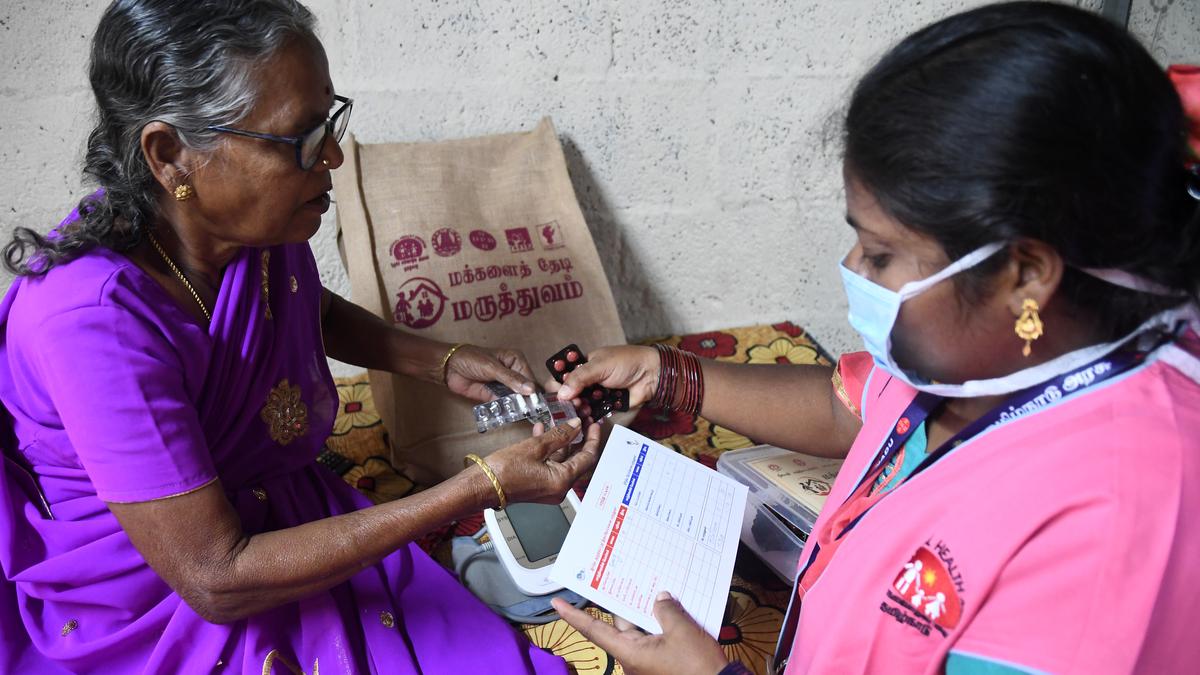
T.N.’s doorstep medical care scheme has reached multiple vulnerable groups, finds survey
The Hindu
State-wide survey evaluates Makkalai Thedi Maruthuvam (MTM) scheme's impact on NCD screening, highlighting disparities and recommendations for improvement.
A State-wide cross-sectional survey has found that Makkalai Thedi Maruthuvam (MTM), a scheme to deliver medical care at the doorsteps of people, has reached out to the most vulnerable groups, such as women in rural areas and Scheduled Caste/Scheduled Tribe categories. While diabetes and hypertension were the most widely covered Non Communicable Diseases (NCD) under MTM, cancer screening coverage was extremely low, it found.
The State Planning Commission, as a part of its evaluation of various flagship schemes of the State government, proposed to evaluate the cascade of care delivered through MTM. The Institute of Community Medicine, Madras Medical College in coordination with the Community Medicine departments of other government medical colleges was engaged in conducting the survey.
The survey conducted among persons aged above 30 years had a total sample size of 5,760 households. Among the study participants, 4,155 (60%) were from rural areas and 2,701 (40%) from urban areas. As many as 2,575 men and 4,279 women were surveyed. While 24.8% of the participants did not want to reveal their community, among those who did reveal it, 2,416 belonged to BC; 1,589 belonged to MBC; 825 to SC and 220 to ST.
Nearly 78.84% of the study participants were aware of MTM, and 73% had been visited by Women Health Volunteers (WHV). In screening for hypertension, 81.25% of the study population had been screened for hypertension, and among them 93.8% were screened in the last year. Among those screened in the last year, 73.6% were screened through MTM. It also found that a higher proportion of women (82.6%) were screened compared to men (79%), with the screening through MTM in the last year also being higher in women (75.1% versus 71.2%). Under MTM, screening by field workers at the doorstep was high among men compared to women.
The survey noted an urban-rural difference in overall hypertension screening coverage. Screening through MTM for hypertension was 61.5% in urban areas compared to 82.9% in rural areas. Screening coverage through MTM services was significantly higher among SC/ST populations compared to non-SC/ST categories; with the ST population having a higher proportion screened through MTM field workers at 91.4% compared to SC, OC, BC and MBC population.
It found that 22% among the study population were hypertensive. Among those diagnosed with hypertension, one-fifth were diagnosed in the last one year and 96% were reported to be on treatment. Among the hypertensives, two-thirds were receiving treatment under MTM, and specifically, 41% of the hypertensives had received treatment at their doorsteps through field workers. The survey found that 35% of hypertensives had their blood pressure under control.
In screening for diabetes, the survey found that 80% of the study participants had screened for diabetes among whom 93% were screened in the last one year. 69% of those screened in the last one year were screened through MTM. The overall proportion of people who were reported to be diabetic was 21%. Among those diagnosed with diabetes, 16.6% were diagnosed in the last one year and 97% were reported to be on treatment. More than half of those with diabetes received treatment under MTM, and 36% received their medicines through field workers. It found that nearly 10% of diabetics had their sugar levels under control.

Capt. Brijesh Chowta, Dakshina Kannada MP, on Saturday urged Union Finance Minister Nirmala Sitharaman to facilitate speeding up of ongoing critical infrastructure works in the region, including Mangaluru-Bengaluru NH 75 widening, establishment of Indian Coast Guard Academy, and merger of Konkan Railway Corporation with the Indian Railways.










